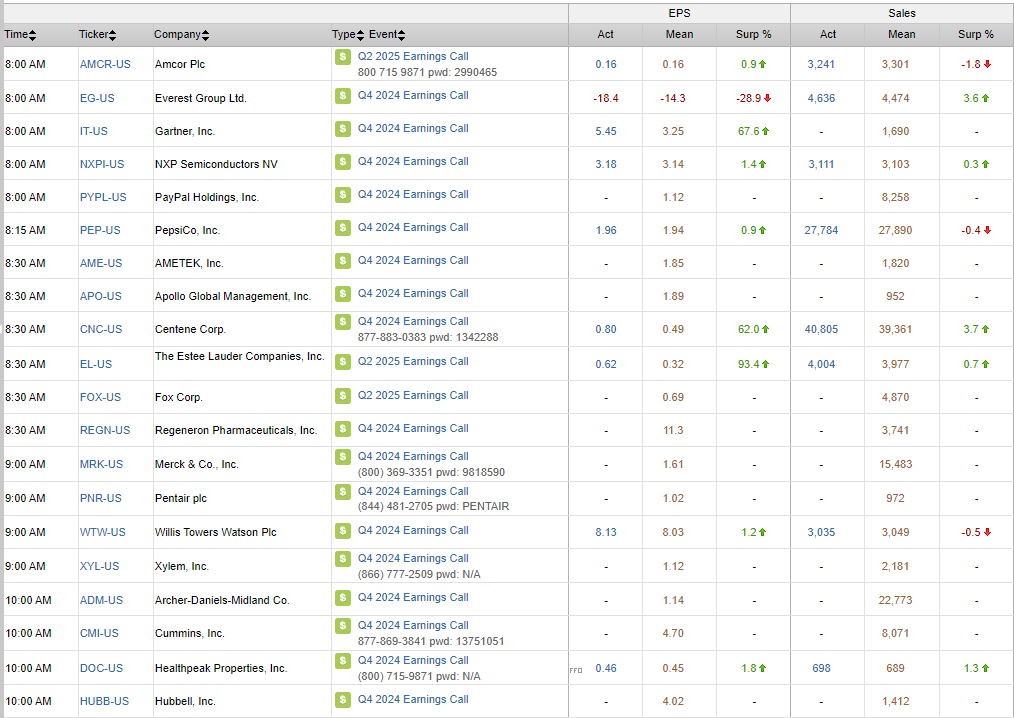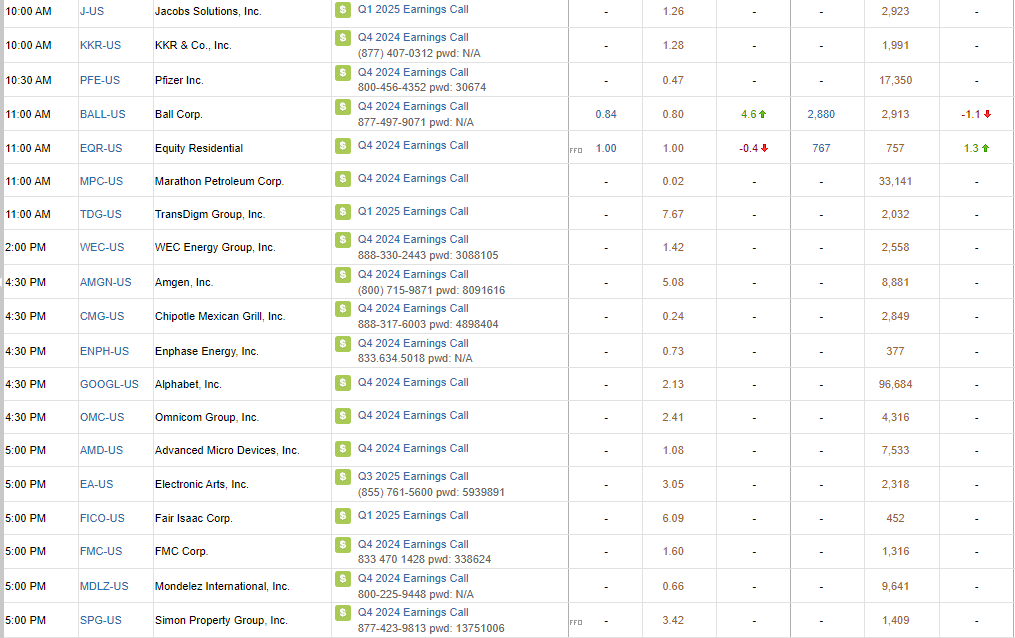S&P futures are down 0.2% Tuesday morning after US equities closed lower Monday, with tech, industrials, and consumer discretionary sectors all falling over 1%, while defensives like consumer staples, healthcare, and energy outperformed. Asian markets were mostly higher overnight, led by Hong Kong (+3%) and South Korea (+1%), while European markets were mixed. Treasuries weakened with curve steepening, the dollar strengthened against the yen and euro, gold fell 0.5%, Bitcoin futures dropped 3.2%, and WTI crude declined 1.8%.
Markets remain defensive amid ongoing tariff volatility. Canada followed Mexico in securing a delay, but China responded to Trump’s 10% levy with retaliatory measures, and speculation is growing that Europe will be next. Analysts continue highlighting stagflation risks from tariffs, tightening financial conditions, and corporate sentiment concerns. AI remains a bright spot following strong results and guidance from Palantir (PLTR).
On the economic calendar, JOLTS job openings and factory orders are due today, with ISM services, ADP payrolls, and Treasury refunding ahead on Wednesday. Nonfarm payrolls, expected at +170K, and Michigan consumer sentiment close out the week Friday.
In earnings, Palantir (PLTR) posted a big beat and raise, driven by US government contracts. NXP Semiconductors (NXPI) Q4 was in line, but Q1 guidance was ~3% light due to macro challenges. Clorox (CLX) beat and raised, though driven by sell-in ahead of an ERP transition. AECOM (ACM) raised the low end of FY25 guidance after an in-line Q1. Woodward (WWD) had a mixed quarter with better EPS but weaker revenue and FCF. Fabrinet (FN) beat and raised on telecom strength, though Datacom faced headwinds from a product transition.
In corporate moves, Synaptics (SYNA) CEO is leaving to become Lumentum (LITE) CEO. Salesforce (CRM) is cutting 1,000+ jobs while expanding AI hiring
US equities closed lower on Monday, though they finished off session lows. The S&P 500 fell 0.76%, the Nasdaq declined 1.20%, and the Dow slipped 0.28%, with all three major indexes down for the week. Market breadth was mixed as big tech was mostly lower, though Meta outperformed. Declining sectors included autos, semiconductors, homebuilders, machinery, chemicals, rails, regional banks, and retail, while relative outperformers included healthcare products, managed care, biotech, payments, restaurants, refiners, aerospace and defense, exchanges, waste management, telecom, and media. Treasuries were mixed, with the curve seeing bear flattening on stagflation worries, though longer-term yields came off early lows. The dollar index rose 0.5%, gold gained 0.8%, Bitcoin futures rebounded slightly after earlier losses, and WTI crude settled up 0.9% in volatile trading.
Market sentiment was heavily influenced by concerns over Trump’s aggressive tariff policies, which initially sparked a broad risk-off move. However, comments from Mexico’s President Sheinbaum helped ease tensions, as she indicated that tariffs on Mexican imports would be delayed for a month in exchange for increased military presence at the U.S. border. Additionally, reports suggested Trump would speak with Chinese President Xi within 24 hours and had a scheduled discussion with Canadian Prime Minister Trudeau, adding to the uncertainty around how tariffs will ultimately be implemented. Meanwhile, speculation grew that the administration might extend tariffs to include a 10% levy on European Union imports.
On the macroeconomic front, January’s ISM Manufacturing Index printed at 50.9, marking its first expansionary reading since October 2022 and exceeding expectations. The report showed strength in new orders, production, and employment, though prices paid also increased. December construction spending topped estimates, rising 0.5% month-over-month. In policy developments, Boston Fed President Collins noted that the central bank would attempt to “look through” price increases stemming from tariffs, while Atlanta Fed President Bostic highlighted broader economic uncertainty. The latest Senior Loan Officer Opinion Survey (SLOOS) indicated little change in credit demand but projected stronger trends for 2025. Treasury’s Q1 borrowing estimate came in at $815 billion, slightly below the prior forecast of $823 billion. Key economic data later this week includes JOLTS job openings and factory orders on Tuesday, ISM Services and ADP private payrolls on Wednesday, and nonfarm payrolls and Michigan consumer sentiment on Friday.
Company-Specific News by Sector
Information Technology
- Apple (AAPL): Reportedly scrapped its project to develop augmented reality glasses.
Communication Services
- Meta (META): Considering changing its incorporation state from Delaware to Texas.
Health Care
- IDEXX Laboratories (IDXX): +11.1% after Q4 earnings and revenue beat expectations, driven by 7% organic growth in its CAG Diagnostic segment. FY25 EPS guidance was above the midpoint, though the revenue outlook was slightly light.
Industrials
- Triumph Group (TGI): +33.9% after announcing it would be acquired by Warburg Pincus and Berkshire Partners for $26 per share in cash, a deal valued at $3 billion, representing a 38% premium to Friday’s close.
Consumer Discretionary
- Tempur Sealy (TPX): +6% after a judge denied the FTC’s attempt to block its proposed acquisition of Mattress Firm.
- ADM (ADM): Reportedly plans to begin layoffs as part of a cost-cutting initiative.
Consumer Staples
- Tyson Foods (TSN): +2.2% after beating Q1 earnings and revenue expectations, with management highlighting its best quarterly performance in over two years, particularly in its chicken segment. FY25 free cash flow guidance also exceeded Street expectations.
- Constellation Brands (STZ): -3.5% after Piper Sandler downgraded the stock to neutral from overweight, citing concerns over potential tariff impacts and uncertainty about price adjustments.
Real Estate
- Prologis (PLD): -1.2% after Raymond James downgraded the stock to market perform from outperform, pointing to valuation concerns and high investor expectations given its earnings growth lagging peers.
Industrials
- Owens & Minor (OMI): -35.2% after reporting preliminary Q4 results that came in below consensus, with revenue and adjusted EBITDA missing expectations. The company also lowered its FY24 EPS and revenue guidance.
Eco Data Releases | Tuesday February 4th, 2025
S&P 500 Constituent Earnings Announcements | Tuesday February 4th, 2025


Data sourced from FactSet Research Systems Inc.


